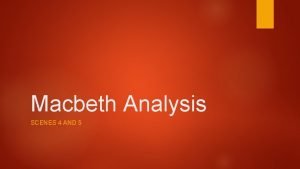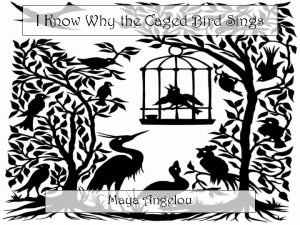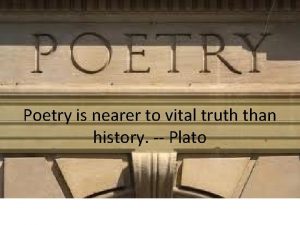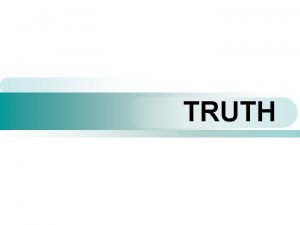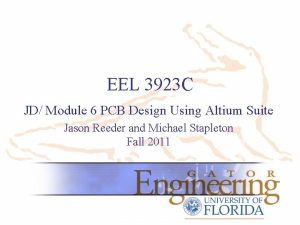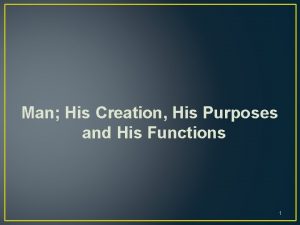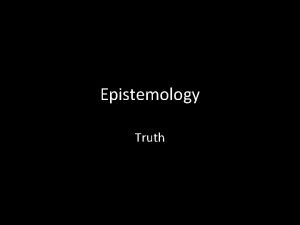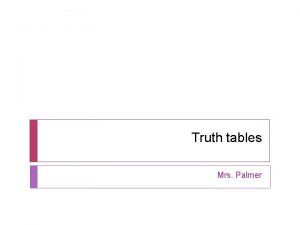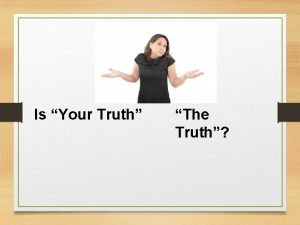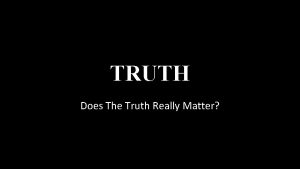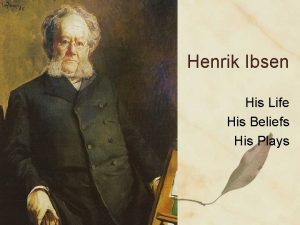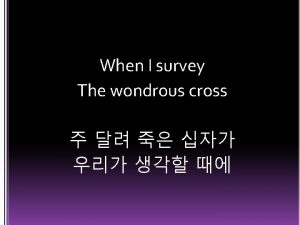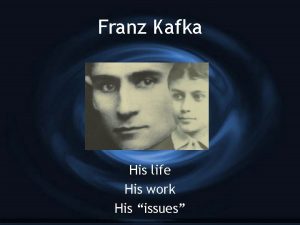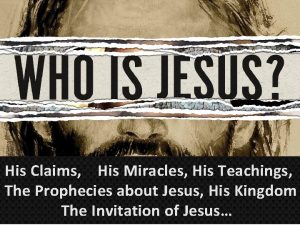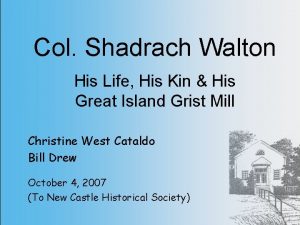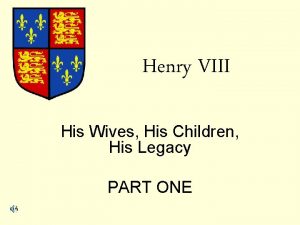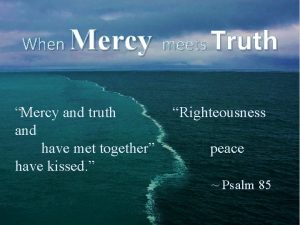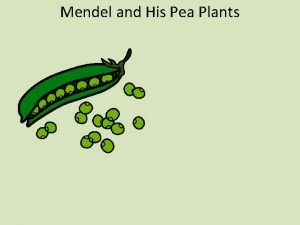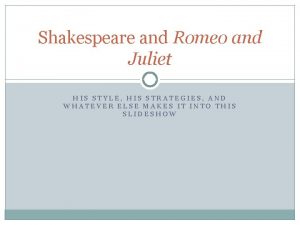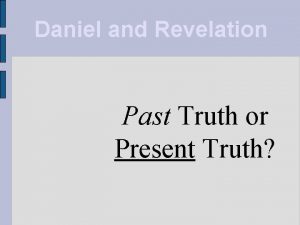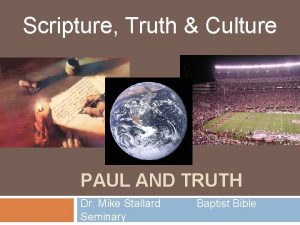HIS 3923 The Truth in History and Truth






























- Slides: 30

HIS 3923 The Truth in History, and Truth of History The Civil War Dr. Lynne Getz

Truth Absolutism -----------------Relativism

Assumptions Examine all assumptions Make no assumptions without evidence Assume the simplest explanation first. (Occam’s Razor)

Zeitgeist • The spirit of the age or spirit of the time • the intellectual fashion or dominant school of thought that typifies and influences the culture of a particular period in time

Paradigm Thomas Kuhn defined it as • “the set of practices that define a scientific discipline at any particular period of time. ” • "universally recognized scientific achievements that, for a time, provide model problems and solutions for a community of practitioners, i. e. , General Meaning: “a distinct set of concepts or thought patterns, including theories, research methods, postulates, and standards for what constitutes legitimate contributions to a field. ”

Historical Method • Primary Sources

Secondary Sources

Oral History

Once Upon a Time Truth came from God, usually through priests

The Seventeenth Century Scientific Revolution Science : • Based on Reason • Leads to Certainty • Replaces Religion as Truth • Objective and Impartial • Makes Progress Inevitable • Reinforces Realism

Empiricism The practice of basing ideas on testing and experience Requires a mindset of Skepticism: Questioning all previous knowledge or authority

The 18 th Century: The Enlightenment

19 th Century: The Age of Science and Progress Georg W. F. Hegel 1770 -1831 August Comte 1798 -1883 Historicism Positivism

Laws of Science and History Charles Darwin 1809 -1882 Karl Marx 1818 -1883

Response of Christianity to Science • Modernism: --accepted Science (evolution), Biblical Criticism, and other modern developments, including feminism • Fundamentalism: --rejected Science (evolution), Biblical Criticism, and other modern developments, including feminism --adhered to “The Fundamentals”

The Fundamentals: • The inerrancy of the Bible • The literal nature of the Biblical accounts, especially regarding Christ's miracles and the Creation Account in Genesis • The Virgin Birth of Christ • The bodily resurrection and physical return of Christ • The substitutionary atonement of Christ on the cross

Sigmund Freud 1856 -1939

Science Applied to History: the Archives and Seminar

19 th C. Nationalist History: Parson Weems & George Bancroft

History Influenced by Marxism: Perspective during the Great Depression Charles A. Beard Mary Ritter Beard

The New Social History Leads to: Multiculturalism Leads to: Cultural Relativism

Post-Modernism Michel Foucault 1926 -1984 Jacques Derrida 1930 -2004

Group Exercise: What is Truth? 10 group points per contributor Write out the group answer in legible handwriting to turn in. If you cannot reach a consensus on the answer, you may choose to submit both a majority report and minority report. All contributors should sign the submission. Your score out of 10 times the numbers of contributors is the total group grade for the exercise.

Define each of the following terms. In your definitions, you must distinguish between these terms. These terms are NOT synonymous. Do NOT even think of looking up any of these definitions on the Internet. Truth Fact Opinion Interpretation

For each of the terms you have defined, answer these questions: Who has credibility on Truth/Fact/Opinion/Interpretation? Why do you give someone credibility when it comes to Truth/Fact/Opinion/Interpretation?

Answer the following for 5 total points: 1. What was the main argument made by Morgan Kousser in “Are Expert Witnesses Whores? Reflections on Objectivity in Scholarship and Expert Witnessing”? 2. What was the main argument made by Robert Wieble in “The Blind Man and His Dog: The Public and Its Historians”?

Debate Scenario #1 A Native American tribe has sued to make the federal government enforce an 1855 Treaty that granted the tribe perpetual fishing and hunting rights around their reservation. If those rights were granted, the state laws currently in effect would have to be exempted to allow Natives to fish and hunt all year, while all non-Natives would still have to follow the state laws prohibiting fishing and hunting except in season. The tribe wants a historian to testify about the Treaty and the tribe’s history, but the non-Natives’ lawyers do not want this expert to testify.

Debate Scenario #2 You are the historian/curator of a local museum that features an antique bed that is touted as “The Bed That George Washington Slept in When He Visited Our Town. ” This display is the pride of the town. You have found out through research in primary sources that George Washington never visited the town and never slept in that bed. You want to remove the display from the museum but the townspeople do not want to get rid of the display.

Debate Scenario #3 You are the local historian in a small Southern town. You have researched the history of the town and discovered two incidents previously forgotten: (1) that in 1912 a black man was brutally lynched for looking at a white woman the “wrong way, ” and (2) that a family from the town helped some Jews escape from Nazi Germany and sheltered them during World War II. You want to write up both stories in the local newspaper, but the editor only wants you to publish the story about saving the Jews.

Debate Scenario #4 You are the historian advising the Texas Legislature on the content of the new U. S. history textbooks for high school students. You want to include a discussion about the dropping of the Atomic Bomb on Japan that shows both sides of the question of whether the bomb was necessary, moral, and appropriate. The legislators want only the positive reasons for the bomb to be presented in the textbook.
 Martin fell off his skateboard and badly bruised
Martin fell off his skateboard and badly bruised Macbeth act 1 scene 1 analysis
Macbeth act 1 scene 1 analysis Louie his cousin and his other cousin
Louie his cousin and his other cousin His wings are clipped and his feet are tied
His wings are clipped and his feet are tied Poetry is nearer to vital truth than history meaning
Poetry is nearer to vital truth than history meaning Hình ảnh bộ gõ cơ thể búng tay
Hình ảnh bộ gõ cơ thể búng tay Ng-html
Ng-html Bổ thể
Bổ thể Tỉ lệ cơ thể trẻ em
Tỉ lệ cơ thể trẻ em Voi kéo gỗ như thế nào
Voi kéo gỗ như thế nào Tư thế worms-breton
Tư thế worms-breton Bài hát chúa yêu trần thế alleluia
Bài hát chúa yêu trần thế alleluia Môn thể thao bắt đầu bằng từ chạy
Môn thể thao bắt đầu bằng từ chạy Thế nào là hệ số cao nhất
Thế nào là hệ số cao nhất Các châu lục và đại dương trên thế giới
Các châu lục và đại dương trên thế giới Cong thức tính động năng
Cong thức tính động năng Trời xanh đây là của chúng ta thể thơ
Trời xanh đây là của chúng ta thể thơ Cách giải mật thư tọa độ
Cách giải mật thư tọa độ Làm thế nào để 102-1=99
Làm thế nào để 102-1=99 độ dài liên kết
độ dài liên kết Các châu lục và đại dương trên thế giới
Các châu lục và đại dương trên thế giới Thể thơ truyền thống
Thể thơ truyền thống Quá trình desamine hóa có thể tạo ra
Quá trình desamine hóa có thể tạo ra Một số thể thơ truyền thống
Một số thể thơ truyền thống Cái miệng nó xinh thế
Cái miệng nó xinh thế Vẽ hình chiếu vuông góc của vật thể sau
Vẽ hình chiếu vuông góc của vật thể sau Thế nào là sự mỏi cơ
Thế nào là sự mỏi cơ đặc điểm cơ thể của người tối cổ
đặc điểm cơ thể của người tối cổ Thế nào là giọng cùng tên? *
Thế nào là giọng cùng tên? * Vẽ hình chiếu đứng bằng cạnh của vật thể
Vẽ hình chiếu đứng bằng cạnh của vật thể Fecboak
Fecboak

